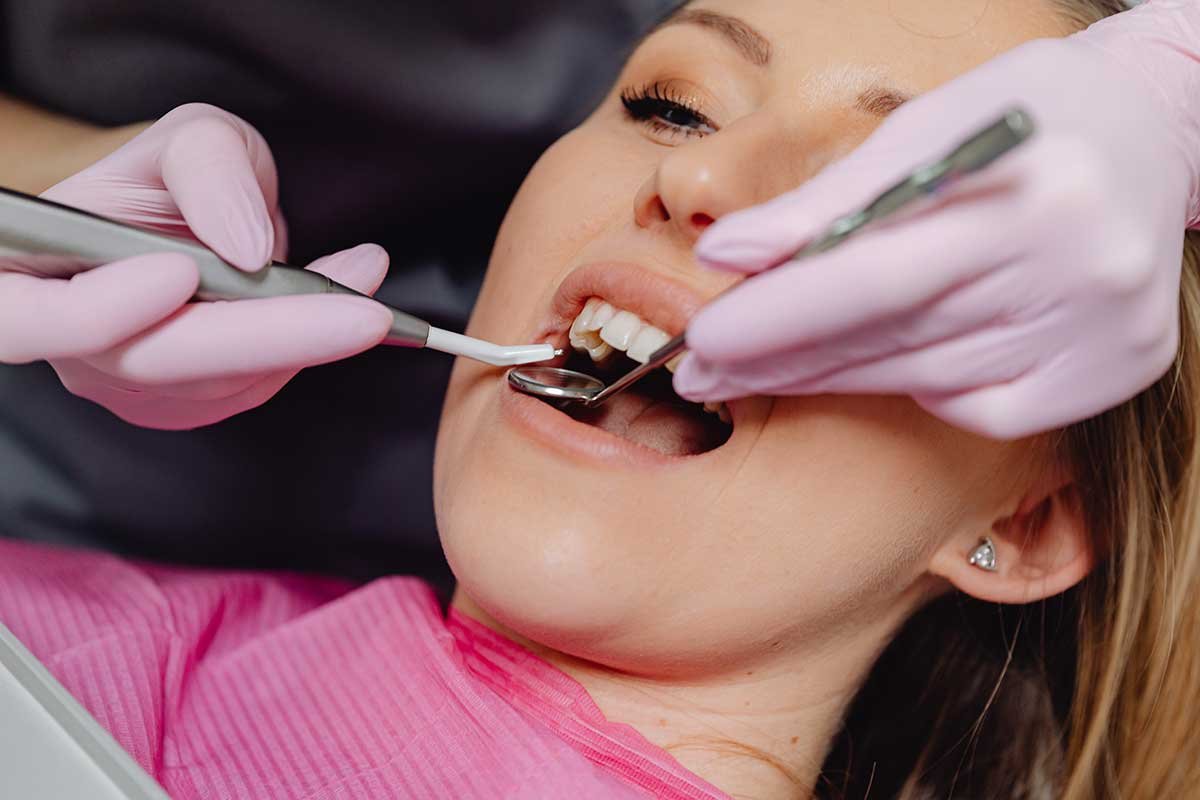Preventative Care

Custom Sports Mouth Guards
A sports mouth guard is a thick rubbery shield worn over the teeth (inside the mouth) that protects the face, jaws and teeth from impact to the face during sporting activities.
It is also strongly recommended by medical experts that both adults and children engage in regular sports/physical activity as it has amazing benefits for physical and mental health.
Each year thousands of adults and children are treated for sports-related dental injuries that could have been prevented or minimized simply by wearing a mouth guard.
Clean Teeth
Many people hesitate to clean their teeth at clinic. In most cases, cleaning your teeth is easy and painless. Most tooth cleanings are performed by a dental hygienist. It begins with a full mouth physical exam before the actual cleaning process begins.
A dental hygienist uses a scaler with a small mirror to remove plaque and tartar around the gum line and between teeth. You will hear scratches, this is normal.
The more tartar you have, the longer it will take to scratch a particular spot. Professional tooth cleanings use toothpaste that smells and tastes like regular toothpaste, but often you can choose the flavor.
Whether you floss regularly at home or not, nothing beats a professional floss session. A dental hygienist will go deep between the teeth to identify potential problem areas that may cause the gums to bleed.
The final step in the cleaning process is fluorine treatment. This remedy is used to protect teeth to fight cavities for several months.


Fresh Breath
You can easily improve bad breath while keeping your teeth and gums healthy. Try these simple steps to keep your mouth fresh and clean.
- Plaque on your teeth attracts the bacteria that cause bad breath. Trapped food also contributes to the problem.
- Mouthwash not only freshens your breath but also provides additional protection by removing bacteria. The refreshing mint scent will lift your mood. However, make sure the mouthwash you choose kills the bacteria that cause bad breath.
- The plaque that normally forms on your tongue can be a host for foul-smelling bacteria. To remove them, gently brush your tongue with a toothbrush.
- Avoid foods that make your breath acidic. Onions and garlic are enemies. But brushing after meals doesn’t help.
- Get rid of the tobacco habit. Smoking not only causes cancer, but it can also damage gums, stain teeth, and cause bad breath.
- If bad breath persists despite your best efforts, see your doctor. They will check if your problem is disease-related.
Healthy Gums
- Floss
- Get regular dental cleanings
- Quit smoking
- Brush twice a day
- Use fluoride toothpaste
- Use a therapeutic mouthwash

Lifestyle Factors
You may brush your teeth frequently and floss daily, but oral hygiene alone is not enough to maintain a healthy smile. There are many aspects of life that can affect the function of your teeth and gums.
Smoking
Smoking gets a lot of negative attention about how it affects your lungs, your budget, and your relationships with others, but it can also have a big impact on your oral health.
Obesity
Most people want to lose a few pounds, but if you’re severely overweight, those extra inches can threaten your oral health. Obese people are at a higher risk of developing gum disease.
Food and Drink Habits
You may not eat many sweets, cakes, or cookies, but you may still be consuming more sugar than you think. Like many foods in the United States, it contains many sweets.
Stress
Is your boss driving you crazy? Are you under a lot of financial pressure? Perhaps you are dealing with drama in your family. The unpleasant things going on in your life can ruin your body from head to toe, including your teeth.
Oral Hygiene Services
Oral hygiene is about keeping your mouth clean and disease-free. This includes brushing and flossing teeth, and regular visits to the dentist for x-rays, examinations, and cleanings.
Oral hygiene is preventive. This means that oral health problems such as tooth decay, gum disease, and bad breath (bad breath) can be prevented before they occur with proper care of your teeth and gums.
What are the signs of poor oral hygiene?
There are several warning signs that indicate oral health problems. The most common symptoms of poverty in oral hygiene include:
- Bleeding gums
- Tooth decay
- Chronic bad breath
- Loose teeth
- Gum recession
- Mouth sores that don’t go away
- Toothache
- Swelling of the jaw
- Gingivostomatitis, is an infection of the mouth caused by certain bacteria or viruses
Children’s Preventive Care
Preventive dental care helps prevent bad things from happening to your teeth and gums. Preventive care includes dental activities that help keep your mouth healthy.
Tooth decay (also called tooth decay or tooth decay) is one of the most common chronic diseases of childhood.
Common oral diseases that affect children:
- Dental caries, which are also called tooth decay or cavities
- Gum diseases, including gingivitis (mild) and pediatric periodontal disease (advanced)
- Dental erosion also referred to as enamel erosion
- Tooth development interruptions and other abnormalities, such as a cleft lip and palate
Benefits of children’s dental care:
- Minimize the risk of tooth decay
- Preserved tooth enamel
- Fight gum disease
- Breathe better
Oral Cancer Screening
Oral cancer screening is an examination done by a dentist or doctor to look for signs of cancer or precancerous in the mouth.
The purpose of oral cancer screening is to detect oral cancer at an early stage when there is a high chance of recovery.
Most dentists perform a mouth exam to check for oral cancer during routine dental visits. Some dentists may use additional tests to identify areas of abnormal cells in your mouth.
People at higher risk of oral cancer are more likely to benefit from oral cancer screening, but research has not conclusively proven this. Factors that can increase the risk of oral cancer include the following:
- Use of tobacco of any kind, including but not limited to tobacco, cigars, pipes, chewing tobacco, and snuff
- Heavy alcohol consumption
- History of oral cancer
- History of significant sun exposure increases the risk of lip cancer

Pregnancy and Oral Health
Pregnant women may also experience behavioral changes such as: B. Dietary habits, exposed to the risk of tooth decay. Women who carry high levels of cavities-causing bacteria during pregnancy and after childbirth can pass these bacteria from their mouths to their babies’ mouths.
Few points for dental health during pregnancy:
- Dental health is an important part of overall health. It is also an important part of prenatal (maternity) care.
- Pregnancy increases the risk of certain dental health problems that lead to pregnancy complications such as premature birth.
- Brush your teeth twice a day and floss once a day.
- Have regular dental check-ups during pregnancy.
- Tell your dentist that you are pregnant.
- Dental x-rays during pregnancy are safe.
- If you have any concerns about your dental health, consult your dentist immediately.

